8 nov 2019

Israeli settlers on Friday chopped off Palestinian-owned olive trees in Umm Safa village northwest of Ramallah City.
Head of Umm Safa's village council Marwan al-Sabbah said that a group of Israeli settlers destroyed six olive trees owned by the brothers Ayman and Akram Tanatra.
Al-Sabbah said that the village has been subjected to regular attacks by Israeli settlers and soldiers, calling on concerned international and local organizations to support the Palestinian farmers of Umm Safa by all possible means.
He noted that the Israeli authorities have threatened to confiscate 200 dunums of the village's land to expand the illegal settlement of Halamish.
Head of Umm Safa's village council Marwan al-Sabbah said that a group of Israeli settlers destroyed six olive trees owned by the brothers Ayman and Akram Tanatra.
Al-Sabbah said that the village has been subjected to regular attacks by Israeli settlers and soldiers, calling on concerned international and local organizations to support the Palestinian farmers of Umm Safa by all possible means.
He noted that the Israeli authorities have threatened to confiscate 200 dunums of the village's land to expand the illegal settlement of Halamish.
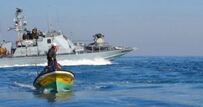
The Israeli occupation navy on Thursday kidnaped two fishermen and confiscated their boat off the southern coast of the Gaza Strip.
According to local sources, Israeli gunboats fired live ammunition and water cannons at the fishermen and their boats as they were working off the shore of Rafah last night.
Naval forces aboard the gunboats kidnaped two fishermen after encircling their boat and confiscating it, the sources added.
Israeli gunboats are around Gaza fishermen almost every day, harassing them, shooting at them, damaging their boats, and making arrests. Sometimes fishermen are injured or killed during gunfire attacks.
Under the 1993 Oslo accords, Palestinian fishermen are permitted to fish up to 20 nautical miles off the coast of Gaza, but since then Israel has kept reducing the fishing area gradually to a limit of three nautical miles as part of its blockade on Gaza.
Fishermen and human rights groups also say that since the 2008-09 war in Gaza, the Israeli army has been regularly enforcing a limit even closer to the shore.
According to local sources, Israeli gunboats fired live ammunition and water cannons at the fishermen and their boats as they were working off the shore of Rafah last night.
Naval forces aboard the gunboats kidnaped two fishermen after encircling their boat and confiscating it, the sources added.
Israeli gunboats are around Gaza fishermen almost every day, harassing them, shooting at them, damaging their boats, and making arrests. Sometimes fishermen are injured or killed during gunfire attacks.
Under the 1993 Oslo accords, Palestinian fishermen are permitted to fish up to 20 nautical miles off the coast of Gaza, but since then Israel has kept reducing the fishing area gradually to a limit of three nautical miles as part of its blockade on Gaza.
Fishermen and human rights groups also say that since the 2008-09 war in Gaza, the Israeli army has been regularly enforcing a limit even closer to the shore.
7 nov 2019
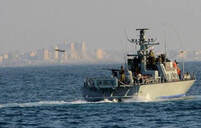
Israeli navy ships attacked, late on Wednesday at night, several Palestinian fishing boats in Gaza territorial waters in Rafah, in the southern part of the coastal region, and abducted two fishermen.
Eyewitnesses said the navy fired several live rounds at the fishing boats, in addition to trying to capsize them with water cannons.
They added that the navy abducted Abdul-Rahman Abdul-Hadi al-Qan, 27, and Mohammad Shehda Zo’rob, 23, after surrounding their boat, and took them to an unknown destination.
Such violations are frequent in the besieged and impoverished Gaza Strip, and include attacks against farmers and workers in areas close to the perimeter fence.
Eyewitnesses said the navy fired several live rounds at the fishing boats, in addition to trying to capsize them with water cannons.
They added that the navy abducted Abdul-Rahman Abdul-Hadi al-Qan, 27, and Mohammad Shehda Zo’rob, 23, after surrounding their boat, and took them to an unknown destination.
Such violations are frequent in the besieged and impoverished Gaza Strip, and include attacks against farmers and workers in areas close to the perimeter fence.
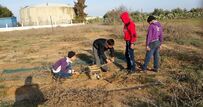
The Israeli occupation forces (IOF) on Thursday morning launched a teargas attack on young bird hunters in a border area near the security fence in the east of central Gaza.
According to SAFA news agency, Israeli soldiers showered young men with tear gas grenades as they were hunting birds near Umm Husseineh area in the east of al-Bureij refugee camp and forced them to leave.
The IOF have targeted farmers, shepherds, bird hunters and citizens several times before during their presence in border areas inside Gaza at the pretext that they entered no-go areas.
According to SAFA news agency, Israeli soldiers showered young men with tear gas grenades as they were hunting birds near Umm Husseineh area in the east of al-Bureij refugee camp and forced them to leave.
The IOF have targeted farmers, shepherds, bird hunters and citizens several times before during their presence in border areas inside Gaza at the pretext that they entered no-go areas.
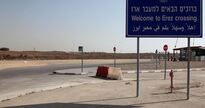
The Israeli occupation forces (IOF) on Wednesday night arrested a Palestinian businessman at the Beit Hanoun (Erez) border crossing, north of the Gaza Strip.
A Palestinian official from the crossings and border authority said that Israeli intelligence officers arrested a businessman called Jamal al-Zaini after he went to the Israeli side of the crossing for an interview.
He added that Zaini had submitted a request asking for a travel permit to enter the 194 occupied lands.
Apart from Zaini, the IOF has arrested eight citizens since the beginning of the current year after they applied for permission to travel through the crossing for medical and commercial purposes.
A Palestinian official from the crossings and border authority said that Israeli intelligence officers arrested a businessman called Jamal al-Zaini after he went to the Israeli side of the crossing for an interview.
He added that Zaini had submitted a request asking for a travel permit to enter the 194 occupied lands.
Apart from Zaini, the IOF has arrested eight citizens since the beginning of the current year after they applied for permission to travel through the crossing for medical and commercial purposes.
6 nov 2019
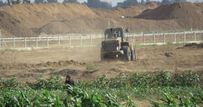
The Israeli occupation forces (IOF) on Wednesday morning carried out a limited incursion into the northeast of the Gaza Strip border.
Local sources said that several armored bulldozers advanced a few meters into a border area in the east of Jabalia and embarked on leveling plots of land.
The sources reported seeing some soldiers deploying barbed wire along the security fence in the area.
The eastern border areas of Gaza are repeatedly exposed to Israeli military incursions and gunfire attacks, which prevents hundreds of farmers from working their lands near the security fence.
Local sources said that several armored bulldozers advanced a few meters into a border area in the east of Jabalia and embarked on leveling plots of land.
The sources reported seeing some soldiers deploying barbed wire along the security fence in the area.
The eastern border areas of Gaza are repeatedly exposed to Israeli military incursions and gunfire attacks, which prevents hundreds of farmers from working their lands near the security fence.
5 nov 2019
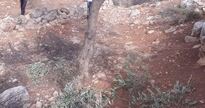
Israeli settlers on Tuesday stole olives from Palestinian farms in al-Lubban ash-Sharqiya south of the West Bank city of Nablus.
Local sources said that Israeli settlers from the nearby illegal settlement of Elieh stole the harvest of about 900 olive trees in al-Lubban ash-Sharqiya.
The West Bank has been witnessing a stepped up wave of settler attacks since the beginning of the olive harvest season last month.
Local sources said that Israeli settlers from the nearby illegal settlement of Elieh stole the harvest of about 900 olive trees in al-Lubban ash-Sharqiya.
The West Bank has been witnessing a stepped up wave of settler attacks since the beginning of the olive harvest season last month.
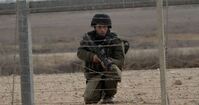
The Israeli occupation forces (IOF) opened fire at border and agricultural areas in the southeast of the Gaza Strip.
According to local sources, Israeli troops at the Kissufim military post opened fire at the border area of al-Qarara town and at cultivated plots of land in the north of Khan Younis province of southern Gaza.
Luckily, no one was hurt in the shooting attack.
According to local sources, Israeli troops at the Kissufim military post opened fire at the border area of al-Qarara town and at cultivated plots of land in the north of Khan Younis province of southern Gaza.
Luckily, no one was hurt in the shooting attack.
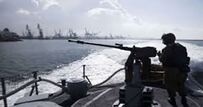
Israeli gunboats on Monday evening opened fire at Palestinian fishermen and their boats in the northern waters of the Gaza Strip.
According to a local committee, the fishermen were working within three to six nautical miles when they were came under fire from gunboats.
The intensity of the shooting forced the fishermen to go ashore.
Luckily, no one was hurt in the shooting attack.
Israeli gunboats are around Gaza fishermen almost every day, harassing them, shooting at them, damaging their boats, and making arrests. Sometimes fishermen are injured or killed during gunfire attacks.
Under the 1993 Oslo accords, Palestinian fishermen are permitted to fish up to 20 nautical miles off the coast of Gaza, but since then Israel has kept reducing the fishing area gradually to a limit of three nautical miles as part of its blockade on Gaza.
Fishermen and human rights groups also say that, since the 2008-09 war in Gaza, the Israeli army has been regularly enforcing a limit even closer to the shore.
According to a local committee, the fishermen were working within three to six nautical miles when they were came under fire from gunboats.
The intensity of the shooting forced the fishermen to go ashore.
Luckily, no one was hurt in the shooting attack.
Israeli gunboats are around Gaza fishermen almost every day, harassing them, shooting at them, damaging their boats, and making arrests. Sometimes fishermen are injured or killed during gunfire attacks.
Under the 1993 Oslo accords, Palestinian fishermen are permitted to fish up to 20 nautical miles off the coast of Gaza, but since then Israel has kept reducing the fishing area gradually to a limit of three nautical miles as part of its blockade on Gaza.
Fishermen and human rights groups also say that, since the 2008-09 war in Gaza, the Israeli army has been regularly enforcing a limit even closer to the shore.
4 nov 2019
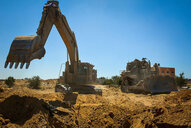
Israel seized 2522 dunums in the occupied West Bank in favor of the construction of illegal settlements, said municipal sources and a cartographer.
Mayor of Al-Jab'a Dhyab Masha'la told WAFA that several Palestinian farmers entered their olive groves adjacent to the nearby illegal settlement of Eli, and were shocked to find Israeli military orders informing them of Israel’s plan to seize their olive groves, which occupy an area of 2,000 dunams (494 acres).
Meanwhile, Israeli forces posted military orders to seize 372 dunams (92 acres) of land in the southern West Bank district of Hebron.
Palestinian cartographer Abdul-Hadi Hantash told WAFA that the so-called “commander of the Israeli military” issued a military order to seize 129 dunums (32 acres) of land belonging to Adh-Dhahiriya and As-Samou' towns, south of Hebron.
Mayor of Surif town, Mohammad Adwan, that Palestinian farmers went this morning to pick their olive groves near the encroaching Israeli settlement of Bet Ayn, but found notices to seize 243 (60 acres) dunams of their groves. The land owner was identified as the Ghneimat family.
In the meantime, the Office of Beit Liqya, a town to the southwest of Ramallah city, confirmed that Israeli forces handed them a military order to seize approximately 150 dunams (37 acres) of Palestinian land located to the south of the town and adjacent to the section of Israel’s apartheid wall.
Mayor of Al-Jab'a Dhyab Masha'la told WAFA that several Palestinian farmers entered their olive groves adjacent to the nearby illegal settlement of Eli, and were shocked to find Israeli military orders informing them of Israel’s plan to seize their olive groves, which occupy an area of 2,000 dunams (494 acres).
Meanwhile, Israeli forces posted military orders to seize 372 dunams (92 acres) of land in the southern West Bank district of Hebron.
Palestinian cartographer Abdul-Hadi Hantash told WAFA that the so-called “commander of the Israeli military” issued a military order to seize 129 dunums (32 acres) of land belonging to Adh-Dhahiriya and As-Samou' towns, south of Hebron.
Mayor of Surif town, Mohammad Adwan, that Palestinian farmers went this morning to pick their olive groves near the encroaching Israeli settlement of Bet Ayn, but found notices to seize 243 (60 acres) dunams of their groves. The land owner was identified as the Ghneimat family.
In the meantime, the Office of Beit Liqya, a town to the southwest of Ramallah city, confirmed that Israeli forces handed them a military order to seize approximately 150 dunams (37 acres) of Palestinian land located to the south of the town and adjacent to the section of Israel’s apartheid wall.

Illegal Israeli settlers today stole the olive harvest of Palestinian farmers in the village of Qaryout, south of the West Bank city of Nablus. video
Local sources said that a number of Palestinian farmers entered their olive groves adjacent to the encroaching nearby illegal settlement of Eli, but they were completely shocked to find out that Israeli settlers had stole their harvest and placed iron barriers to obstruct the access of Palestinian vehicles to the land.
Meanwhile, settlers flooded sewage into groves belonging to Palestinian farmers in the village of Al-Jab'a, west of Bethlehem.
Mayor of Al-Jab'a Dhyab Masha'la confirmed that settlers from the illegal settlement of Bat Ayin discharged their sewage on five dunams planted with olive trees in Wadi al-Khanzir area.
The owner of the olive grove was identified as the sons of Mohammad Ibrahim Abu Luha.
Every year, without fail, much of the olive harvest is characterized by attacks on Palestinian farmers and families by Israeli settlers and armed soldiers.
Over the past two weeks, the West Bank witnessed a wave of settler attacks and agricultural terrorism as Palestinian farmers began the year’s olive harvest. Attacks were mainly in northern villages near Nablus and Salfit, governorates with the largest concentration of illegal Israeli settlements.
Settlers attacked olive harvesters in Burin, a village south of Nablus, on 12 October, the same day as a 55-year-old Palestinian farmer was attacked by settlers in the nearby village of Tel. Two days prior, settlers stole olives from trees belonging to farmers also in the same area.
Armed settlers attacked farmers in the village Shufa, near the city Tulkarem in the north, who threatened to shoot farmers if they did not leave their land.’
The most devastating attack occurred on the morning of 16 October when more than 30 masked armed settlers charged at Palestinian farmers and foreign volunteers in Burin, attacking three internationals and seriously injuring one, including 80-year-old Rabbi Moshe Yehuda from the Rabbis for Human Rights organization.
With more than 12 million olive trees planted across 45% of the West Bank’s agricultural land, the olive harvest constitutes one of the biggest sources of economic sustainability for thousands of Palestinian families.
According to UN OCHA, the olive oil industry supports the livelihoods of more than 100,000 families and accounts for a quarter of the gross agricultural income of the occupied territories.
But, as local NGO MIFTAH notes, “olive trees carry more than an economic significance in the lives of Palestinians. They are not just like any other trees, they are symbolic of Palestinians’ attachment to their land.”
“Because the trees are drought-resistant and grow under poor soil conditions, they represent Palestinian resistance and resilience. The fact that olive trees live and bear fruit for thousands of years is parallel to Palestinian history and continuity on the land.”
Local sources said that a number of Palestinian farmers entered their olive groves adjacent to the encroaching nearby illegal settlement of Eli, but they were completely shocked to find out that Israeli settlers had stole their harvest and placed iron barriers to obstruct the access of Palestinian vehicles to the land.
Meanwhile, settlers flooded sewage into groves belonging to Palestinian farmers in the village of Al-Jab'a, west of Bethlehem.
Mayor of Al-Jab'a Dhyab Masha'la confirmed that settlers from the illegal settlement of Bat Ayin discharged their sewage on five dunams planted with olive trees in Wadi al-Khanzir area.
The owner of the olive grove was identified as the sons of Mohammad Ibrahim Abu Luha.
Every year, without fail, much of the olive harvest is characterized by attacks on Palestinian farmers and families by Israeli settlers and armed soldiers.
Over the past two weeks, the West Bank witnessed a wave of settler attacks and agricultural terrorism as Palestinian farmers began the year’s olive harvest. Attacks were mainly in northern villages near Nablus and Salfit, governorates with the largest concentration of illegal Israeli settlements.
Settlers attacked olive harvesters in Burin, a village south of Nablus, on 12 October, the same day as a 55-year-old Palestinian farmer was attacked by settlers in the nearby village of Tel. Two days prior, settlers stole olives from trees belonging to farmers also in the same area.
Armed settlers attacked farmers in the village Shufa, near the city Tulkarem in the north, who threatened to shoot farmers if they did not leave their land.’
The most devastating attack occurred on the morning of 16 October when more than 30 masked armed settlers charged at Palestinian farmers and foreign volunteers in Burin, attacking three internationals and seriously injuring one, including 80-year-old Rabbi Moshe Yehuda from the Rabbis for Human Rights organization.
With more than 12 million olive trees planted across 45% of the West Bank’s agricultural land, the olive harvest constitutes one of the biggest sources of economic sustainability for thousands of Palestinian families.
According to UN OCHA, the olive oil industry supports the livelihoods of more than 100,000 families and accounts for a quarter of the gross agricultural income of the occupied territories.
But, as local NGO MIFTAH notes, “olive trees carry more than an economic significance in the lives of Palestinians. They are not just like any other trees, they are symbolic of Palestinians’ attachment to their land.”
“Because the trees are drought-resistant and grow under poor soil conditions, they represent Palestinian resistance and resilience. The fact that olive trees live and bear fruit for thousands of years is parallel to Palestinian history and continuity on the land.”
Page: 45 - 44 - 43 - 42 - 41 - 40 - 39 - 38 - 37 - 36 - 35 - 34 - 33 - 32 - 31 - 30 - 29 - 28 - 27 - 26 - 25 - 24
